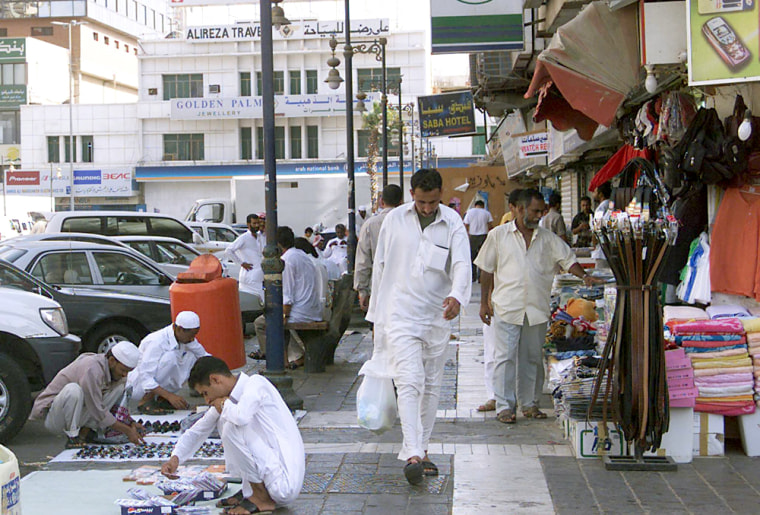Saudi Arabia and three other U.S. allies in the Middle East are among countries added to a State Department list of nations that are not doing enough to stop international human trafficking, a practice the department described as modern-day slavery.
The State Department on Friday said 14 countries could be subject to sanctions because they are not cracking down on trafficking. Eight countries were new to the list: Bolivia, Cambodia, Jamaica, Kuwait, Qatar, Saudi Arabia, Togo and the United Arab Emirates.
It cited the case of a 17-year-old orphan, Lusa, who was kidnapped from Uzbekistan and sold into a slavery ring in the UAE. She was eventually “no longer usable” as a prostitute and the emirates’ immigration service said she should serve a two-year prison sentence for entering the country illegally.
“Trafficking in human beings is nothing less than a modern form of slavery,” Secretary of State Condoleezza Rice said as she released the report.
Saudi Arabia is a key U.S. ally whose de facto leader, Crown Prince Abdullah, visited President Bush at his Texas ranch in April. The report follows one by the State Department in September that accused the kingdom of severe violations of religious freedom.
Kuwait, Qatar and the United Arab Emirates also are allies, and the United States maintains an important military base in Qatar.
Half are children
An estimated 600,000 to 800,000 people are trafficked across international borders annually, the report said. Eighty percent are female and 50 percent are children.
John Miller, Rice’s senior adviser on human trafficking, said the State Department believes that “modern-day slavery plagues every country, including the United States.”
Miller said the report’s goal “is not to punish, but to stimulate government action to eliminate” human trafficking.
Human trafficking is driven by poverty, corruption, poor education and other factors on the supply side, the report said. Trafficking serves demands for cheap or forced labor, soldiers, prostitutes and the child sex trade, the report said.
“The child sold by his parents to the owner of a brick kiln on the outskirts of his rural Indian village is a trafficking victim,” the report said. “So is the Mexican man who legally or illegally migrates to the United States only to be beaten by his agricultural crew leader to keep him from leaving the job.”
The annual “Trafficking in Persons” report examines trafficking problems in 150 countries. It is aimed at raising public awareness of the global trafficking problem and encouraging governments to combat it.
Countries that were previously on the list and remain there this year are Myanmar, Cuba, Ecuador, North Korea, Sudan and Venezuela.
Possible penalties
Countries that fail to do enough to eliminate human trafficking can be subject to a variety of punishments, including the withholding of some kinds of U.S. foreign aid. The United States will not cut off trade and humanitarian aid, the report said.
Countries that receive no such assistance can be declared ineligible to taker part in cultural and educational exchange programs.
Countries that were on the list in 2004 and have been removed from this year’s list are Bangladesh, Equatorial Guinea, Guyana and Sierra Leone.
Congress began requiring the annual reports in 2000.
The United States spends $96 million to help other countries combat trafficking, Rice wrote in a forward to the report.
One U.S. official, who asked not to be named, suggested the real impact of the report was that the stigma it created rather than any threat of sanctions.
“No country wants to be on this list because they do not want to be seen as not working effectively and actively against this problem,” he said.
No comment from Saudis
Saudi officials were not immediately available to comment on the expected criticism.
Victims of trafficking in Saudi Arabia come mainly from the Philippines, Sri Lanka and Bangladesh to work as domestic servants and laborers while others from Africa are forced into begging rings, according to last year’s State Department report.
In the cases of Kuwait, Qatar and the UAE, the State Department also said boys were trafficked and forced to work as camel jockeys.
In Qatar, the government banned the use of child jockeys in May. Rights groups say several thousand boys, some as young as three, work as jockeys in the Gulf Arab region’s lucrative races.
Many governments, particularly those rebuked in the State Department’s annual rights reports, complain the United States has little credibility in criticizing other nations because of scandals in recent years involving U.S. abuse of prisoners.
The full report is online at www.state.gov/g/tip/rls/tiprpt/2005/.
